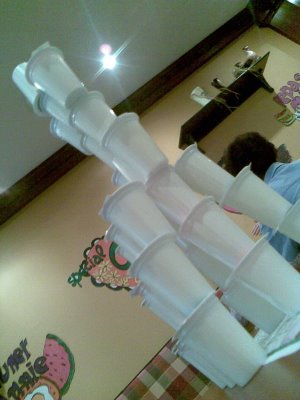Truth in design, Truth in production
There are two examples I like to use when explaining Truth in design. They both have to do with materiality. Here goes. Say you're designing a poster. You want it to look a little old school, a little messy, but still a little official. In short, you want your typography to have the look of an old-timey typewriter font. An easy reaction, when pressed for time, is to grab a typewriter font. I'm not talking about Courier, but instead about something that tries to mimic the little errors and ink blots of a worn out typewriter. But that font isn't very true. Use it and you'll find that all the letters look the same, each instance of a letter exactly like its siblings. It's not organic. It lacks soul. Not only that, but it's obvious that it wasn't done with a real typewriter. Then there's the truthful way. You dig out the old typewriter and honest to goodness type out the text you want. Scan it, clean it, integrate it into the poster. Each letter is a little different and the whole thing comes by its blotches honestly. In short, it's true. It's meant to look like the product of a typewriter and it does because it is.
Truth, however, is also utilitarian. That's where my other example, the one with the corkboard, comes in. Say, for the sake of argument, that you want the look of pictures or notices pinned to a corkboard. Sure, you can open up your graphics program and plunk a stock texture of cork in. You can drag whatever you want onto it, even simulate the shadows cast by the tacks. But why would you? In real life, light casts shadows for you. If you actually print the photos (or notices, or whatever) and pin them to a real cork board, it looks right, automatically. Why add shadows when light can do it for you? If you try to do it digitally, you'll miss something, or agonize for far too long in order to not miss anything. Do it in reality and the details are taken care of. Nature does half the work for you.
In essence, Truth is about materiality and reality. It's about doing it properly, with the right materials. In an idealistic sense, it's about knowing that you've got something right, that it is how it should be and isn't just an imitation. In a practical sense, it's about covering your bases, not by thinking out every eventuality, but by letting reality do the work. It may not always be convenient, but it will always be right.
Labels: analysis, clever ideas, creativity, design, good enough, not good enough, perfection


